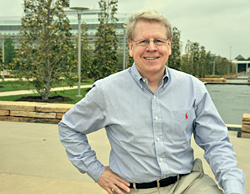Enrollment at UT Dallas has set several new records, according to Census Day figures collected last week. Although a record total had been expected, two metrics — the proportion of new students on campus and the proportion of overall student body growth — were unusually large, prompting University administrators to embark on a survey of new students.
At nearly 19,000, total enrollment includes 6,251 new students, or almost 33 percent. This includes 1,777 first-time-in-college freshmen, 2,034 transfers and 2,440 new graduate students. The freshman class includes the largest number of National Merit Scholars (52) ever in a single class. They join 90 continuing National Merit winners, for a total of 142 on campus.

President David E. Daniel says the growing number of National Merit Scholarship winners at UT Dallas attests to the University’s ability to offer rigorous programs for talented students.
These preliminary numbers indicate that the student population has grown more than 10 percent since last year and more than 30 percent since 2005.
UT Dallas’ strategic plan calls for the University to scale up to 25,000-30,000 students. UT Dallas President David E. Daniel said the expansion is being carefully managed to meet the needs of students, faculty and the community at large.
“A key goal of our strategic plan is to expand the student body to about 22,000 by 2017, but it is becoming a distinct possibility that we will exceed our goal,” Daniel said. “The numbers bear out that exceptionally talented students are purposefully choosing us because we offer sought-after majors and academic programs, and we have exceptionally talented faculty who are attractive to, and ready to work, with such students.”
UT Dallas’ average SAT score for entering freshmen is typically among the highest of any Texas public university. Early data show that the average entering freshman SAT score for fall 2011 is 1248 up three points from last year. Nearly 40 percent of incoming freshmen graduated in the top 10 percent of their high school classes, and almost 75 percent were from the top 25 percent.
“National Merit Scholars are some of the all-around most academically talented high school students,” Daniel said. “That these students are selecting UT Dallas as a place to continue their education is an indicator that we provide the type of rigorous, challenging programs that will help them succeed in their careers and beyond. In addition, we seek and have successfully recruited an increasingly diverse student body with a broad range of exemplary accomplishments both academic and oriented toward service and leadership.”
The surge in enrollment prompted University administrators to create a survey to track new student feedback.
According to Richard Huckaba, associate provost at the University, the survey went to all new students, ranging from freshmen to graduate and doctoral-level students. They were polled on issues ranging from majors, to how they chose UT Dallas, to extracurricular offerings, to housing.
“This survey gives us confirmation of things we already know, but it also gives us targeted student feedback that we can use for our planning processes for next fall, including decisions about hiring faculty and adding classrooms,” Huckaba said. “We also see in the survey, for example, that our undergraduate students are interested in research opportunities, as are our graduate students. And, of course, that a large number of our freshman students are on Academic Excellence and other merit-based scholarships, and a large number of the survey respondents indicated that financial support was an important factor in their decision to come to UT Dallas.”
In other figures for fall 2011:
- 63 percent of students are undergraduates, and 37 percent are graduate students.
- 71 percent are full-time students, and 29 percent are part-time.
- The retention rate for freshmen — those who returned from fall 2010 — is 82 percent.
- 56 percent of students are male, and 44 percent are female.
- The oldest student is 81, and the youngest,16.
Since 2005, UT Dallas has added 33 degree programs, two residence halls and a dining hall. Privately funded campus enhancements include reflecting pools, new outdoor seating and performance areas on the mall, and the planting of more than 5,000 trees throughout campus. Also added in the last five years are a Visitor Center and University Bookstore, the Science Learning Center and renovations to a facility at the heart of the campus, Founders Hall. Work is set to begin on the new four-story Arts and Technology Complex, and construction on a third residence hall is under way to accommodate the growing number of freshmen who choose to live on campus.
Fall enrollment figures are a testament to the hard work of faculty and staff in recruiting, work that extends from meeting with and talking to prospective students to building and maintaining an attractive and serviceable campus infrastructure, Daniel said.
“We are ahead of schedule in terms of our growth strategy, and I am optimistic about our future,” Daniel said. “The top-quality students UT Dallas continues to attract, along with continued growth in faculty, research activity and private support, put us in a position for a place among the nation’s top research universities.”